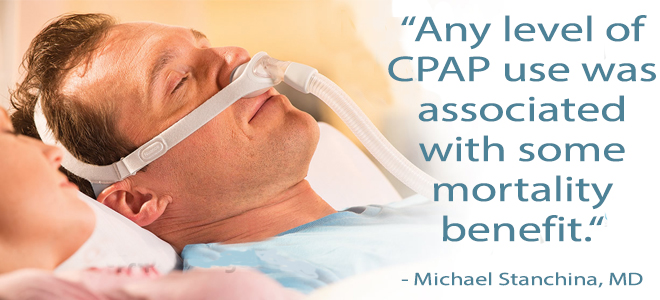“And death shall have no dominion,” wrote the poet Dylan Thomas on the notion of immortality. While the idea of immortality is an interesting one – and perhaps a farfetched one – the least we can do is try to live longer. However, with people who suffer from sleep apnea, the very idea of mortality comes into question, because death is a very real concern. Yet, a new study that was recently published in the Journal of Clinical Sleep Medicine shows that people who received CPAP treatment for their sleep apnea had lower mortality rates than patients who did not receive the treatment.

The study, which was conducted by Brown University Researchers, took a retroactive look at the case files of 10,272 outpatients – 3,396 of which had either sleep apnea or COPD (chronic obstructive pulmonary disease) and 227 patients had both conditions. The researchers then looked at the individual lifestyles of each of the patients and how well they adhered to CPAP treatments during the first one to three months of treatment. Researchers looked at the case files of patients between the years of 2007 and 2010 – and they found that even patients who minimally committed to treatment lived longer.
At the end of the study, 17 of the patients studied had passed away. The common denominator, researchers surmised, was that patients didn’t stick to CPAP treatments. While the study didn’t go into details as to how each patient died, you can guesstimate that there were probably a number of different ways, because sleep apnea can cause a ripple effect of cataclysmic and fatal consequences – from cardiac arrest, stroke and even car accidents from falling asleep behind the wheel. The surprising thing about this study is that out of the thousands of patients, even the smallest amount of CPAP treatment reduced mortality rates.
Moreover, the study also showed that the more hours a night patients remained steadfast about treatment, the longer they lived. In essence, CPAP was giving them life. Out of 17 patients that died, only 21.2% used CPAP on a nightly basis for 4.5 hours – versus the 65.9% who are alive and well today. What does this study mean for sleep apnea sufferers? It means that not only can CPAP treatment help you get to sleep at night and prevent you from grasping for air, it can also increase your lifespan. So, if you want to live longer, remember to wear your CPAP mask – you’ll thank yourself each time you wake up the next morning. If you don’t have a CPAP mask and want to get tested for sleep apnea, Click Here to learn about the Easy Sleep Apnea Test Package.
Source: Stanchina ML; Welicky LM; Donat W; Lee D; Corrao W; Malhotra A. “Impact of CPAP use and age on mortality in patients with combined COPD and obstructive sleep apnea: the overlap syndrome.” J Clin Sleep Med 2013;9(8):767-772.










